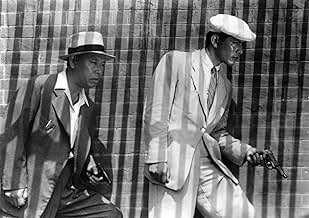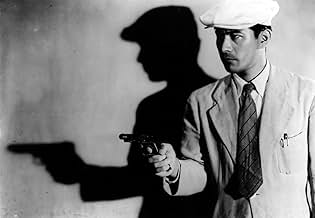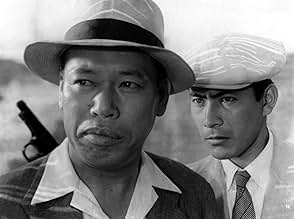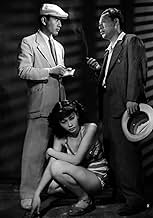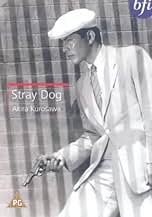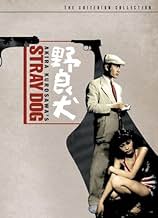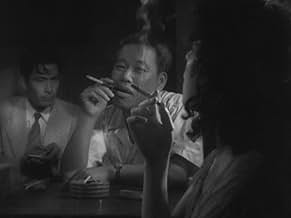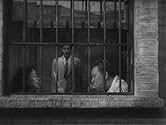AVALIAÇÃO DA IMDb
7,8/10
20 mil
SUA AVALIAÇÃO
Durante um verão escaldante, um detetive de homicídios novato tenta encontrar sua pistola Colt roubada.Durante um verão escaldante, um detetive de homicídios novato tenta encontrar sua pistola Colt roubada.Durante um verão escaldante, um detetive de homicídios novato tenta encontrar sua pistola Colt roubada.
- Direção
- Roteiristas
- Artistas
- Prêmios
- 4 vitórias no total
- Direção
- Roteiristas
- Elenco e equipe completos
- Produção, bilheteria e muito mais no IMDbPro
Avaliações em destaque
10poe426
With his penchant for incorporating "Western" ideas into his films, Kurosawa hits yet another home run with his take on the crime film. As ever, he manages to make scenes that would (in the hands of a lesser director) seem boring become absolutely riveting. Mifune's ride on the trolley, when he loses his gun, for instance; or the scene where he has to explain the situation to his superiors (and the subsequent search through police files for a suspect); or the long undercover sequence. We can almost feel his frustration. The tension mounts. And yet again we have the brilliant Shimura playing off of Mifune, speaking in carefully modulated tones as he dispenses advice to the hotheaded young detective. If ever there was a more perfect combination of performers in cinema history, I never saw them.
Captivating American-esque noir, one of Kurosawa's first great films. What seems like a weak premise for a thriller at the start actually ends up providing a great central situation for this movie which drives it forward much better than, say, Donzoko. Music, also is great.
Toshiro Mifune, looking young and handsome, is quite marvellous as the central character, a detective whose gun is stolen on a bus. What starts out as a detective nervous about finding his gun and fixing a silly mistake, develops into a frantic and desparate man who feels somehow responsible for whatever crimes are committed with his gun. The suspense and detective-story plot are well developed in Stray Dog, but what really makes the story captivating is the revelation of the central character's feeling of guilt throughout, and his learning about crime, criminals, and that what is important is to make good come of your mistakes.
Toshiro Mifune, looking young and handsome, is quite marvellous as the central character, a detective whose gun is stolen on a bus. What starts out as a detective nervous about finding his gun and fixing a silly mistake, develops into a frantic and desparate man who feels somehow responsible for whatever crimes are committed with his gun. The suspense and detective-story plot are well developed in Stray Dog, but what really makes the story captivating is the revelation of the central character's feeling of guilt throughout, and his learning about crime, criminals, and that what is important is to make good come of your mistakes.
Impressive as some of the later films of Kurosawa are - "Kagemusha" and "Ran" for example, I have to confess that it is his early work, particularly those set in modern Japan as opposed to its feudal past, that I find myself returning to with greater pleasure. He was not one of those artists who necessarily got better and better, rather was he one who continued to take on different challenges, not always with the same degree of success, as "Dodesukaden" and "Dreams" were to prove. I have long regarded the 1952 "Ikiru" as his greatest achievement, with the three modern day day films starring Toshiro Mifune that precede it, "Drunken Angel", "The Quiet Duel" and "Stray Dog", fascinating consolidations of his skill as a director. "Stray Dog" revels in technical accomplishment. It tells the story of a policeman who, after experiencing the theft of his gun while travelling on a bus, embarks on an odyssey to retrieve it. Questions of morality and honour loom large as they do in any Kurosawa film, with the quest becoming ever more urgent as evidence is gathered of the weapon being used in criminal activities. What might be regarded as plain bad luck in another culture is here seen as a matter of shame and dishonour by the unfortunate policeman, that has to be addressed forsaking all else. The search is pursued in a dazzling series of chases, encounters and interrogations that leaves the audience, like the hero, exhausted at times. The weather is hot throughout, characters sweat profusely and sometimes everything erupts in a tropical downpour - no other director uses rain so physically. Perhaps, at over two hours, "Stray Dog" is a little too long to sustain its material. It sags a little in the middle, but the chases at the outer ends of the film are wonderfully done, particularly the penultimate sequence where the cop pursues his prey through vegetation where city and countryside meet. You can almost smell the steamy atmosphere of a morning after rain where everything is about to heat up again. Possibly the other two Mifune films of the same period have the edge on this. They are more meditative works, their lengths more sustainable. But, for sheer cinematic bravado, this is the one.
In ravished, Post-War Tokyo, rookie Detective Murakami's (Young Toshiro Mifune) gun is stolen. Being the crippling times, guns are tough to come by. Soon, victims are found, slain with bullets from Mifune's gun. The man-hunt is on, while Tokyo goes through a devastating heatwave, and Mifune goes through an equally devastating change ("A Stray Dog sees only what it chases" a detective warns him.) Made well before Akira Kurosawa became famous for "Rashomon", "Stray Dog" is a roaring classic! Every character's movement reflects either the horrid heatwave, or the living conditions. It is ironic that a downpour (Kurosawa's favorite on-screen weather condition) breaks the heat just as the tensions in the film mount. How "Bicycle Thief" reflected the times of post war Italy, this classic does the same for post war Japan.
A long-standing blemish on my status as a film buff has been the fact that I had never seen a film directed by Akira Kurosawa, easily the most well-known and respected Japanese filmmaker. Finally, my drought has been broken, as I sat down last night to enjoy 'Nora inu / Stray Dog (1949).' A police procedural in the classic film-noir tradition, the film stars Kurosawa-regular Toshirô Mifune as a young homicide detective whose firearm is pick-pocketed while on a bus. When it becomes clear that the weapon has fallen into the hands of a desperate, murdering criminal, Det. Murakami becomes consumed with guilt and shame, and it is only through the experienced guidance of mentor Det. Sato (Takashi Shimura) that he can overcome his insecurities and track down the suspect. 'Stray Dog' was the director's tenth film, and the third in a wealth of collaborations with Mifune throughout an illustrious career. Though it is not quite the masterpiece I had {probably unreasonably} been anticipating, I can only promise that my first Kurosawa will certainly not be my last.
Surprisingly, 'Stray Dog' is similar in many regards to Vittorio De Sica's neorealist masterpiece 'The Bicycle Thief (1948).' Both films concern a disillusioned man's seemingly-futile search for an essential stolen object, in a city of poor and pitiable individuals, where, in the aftermath of World War Two, widespread economic difficulties have forced many towards a life of crime. When Det. Murakami first begins searching for his stolen gun, there is a wonderful extended sequence in which he purposelessly wanders the poverty-stricken streets, experiencing the decadence of society for himself, for the first time understanding why a criminal might have been forced to tread a darkened path. A very important theme of the film is the obvious parallel between Det. Murakami and his suspect, Yusa (Isao Kimura). Both individuals fell on hard times when their knapsacks were stolen: while the former took the crucial step towards law enforcement, the latter chose the opposite path, eventually becoming a thief and a wanted murderer. In the story's climactic chase sequence, the two men tussle violently in the undergrowth, their faces becoming coated in a layer of mud; for a decisive few moments, detective and criminal are practically indistinguishable from each other.
One component of film-making that Kurosawa had evidently mastered by 1949 was creating intensity, and, in many ways, 'Stray Dog' is simply discomforting to watch. The events of the film appear to take place during an extreme heatwave, and the perspiration clings to the skin of the actors as though they are practically roasting in their seats. When the story reaches a devastating climax, its arrival is heralded by the breaking of a storm, the passing of the sweltering drought perhaps symbolising that the dull, futile routine of police procedure has come to an end. I was also impressed by the frantic chase sequences at both the beginning and end of the film, which, aside from being exceptionally thrilling, were genuinely harrowing. Watching Murakami and Yusa grapple in the vegetation, before both collapsing to the ground in fatigue, I don't think I've ever seen film characters looking so utterly exhausted. Despite a masterful opening and closing, 'Stray Dogs' tended to drag a lot in the middle, with the two detectives moving from one possible witness to the other, very slowly gathering the information they require to track down their suspect. Nonetheless, I now have the massive undertaking of deciding which of Akira Kurosawa's films I will watch next.
Surprisingly, 'Stray Dog' is similar in many regards to Vittorio De Sica's neorealist masterpiece 'The Bicycle Thief (1948).' Both films concern a disillusioned man's seemingly-futile search for an essential stolen object, in a city of poor and pitiable individuals, where, in the aftermath of World War Two, widespread economic difficulties have forced many towards a life of crime. When Det. Murakami first begins searching for his stolen gun, there is a wonderful extended sequence in which he purposelessly wanders the poverty-stricken streets, experiencing the decadence of society for himself, for the first time understanding why a criminal might have been forced to tread a darkened path. A very important theme of the film is the obvious parallel between Det. Murakami and his suspect, Yusa (Isao Kimura). Both individuals fell on hard times when their knapsacks were stolen: while the former took the crucial step towards law enforcement, the latter chose the opposite path, eventually becoming a thief and a wanted murderer. In the story's climactic chase sequence, the two men tussle violently in the undergrowth, their faces becoming coated in a layer of mud; for a decisive few moments, detective and criminal are practically indistinguishable from each other.
One component of film-making that Kurosawa had evidently mastered by 1949 was creating intensity, and, in many ways, 'Stray Dog' is simply discomforting to watch. The events of the film appear to take place during an extreme heatwave, and the perspiration clings to the skin of the actors as though they are practically roasting in their seats. When the story reaches a devastating climax, its arrival is heralded by the breaking of a storm, the passing of the sweltering drought perhaps symbolising that the dull, futile routine of police procedure has come to an end. I was also impressed by the frantic chase sequences at both the beginning and end of the film, which, aside from being exceptionally thrilling, were genuinely harrowing. Watching Murakami and Yusa grapple in the vegetation, before both collapsing to the ground in fatigue, I don't think I've ever seen film characters looking so utterly exhausted. Despite a masterful opening and closing, 'Stray Dogs' tended to drag a lot in the middle, with the two detectives moving from one possible witness to the other, very slowly gathering the information they require to track down their suspect. Nonetheless, I now have the massive undertaking of deciding which of Akira Kurosawa's films I will watch next.
Você sabia?
- CuriosidadesMuch of the film was filmed from the slum streets of post war Japan. These were filmed under chief assistant director Ishirô Honda, who had gone with camera operator Kazuo Yamada into some dangerous, even yakuza run, territory. Many of the scenes of Toshirô Mifune's character from the waist down are actually Honda standing in. In his book, Something Like an Autobiography, Akira Kurosawa described Honda's role stating, "I had Honda do mainly second-unit shooting. Everyday I told what I wanted and he would go out into the ruins of postwar Tokyo to film. There are few men as honest and reliable as Honda. He faithfully brought back exactly the footage I requested, so almost everything he shot was used in the final cut of the film. I'm often told that I captured the atmosphere of postwar Japan very well in Stray Dog, and if so I owe a great deal of that success to Honda."
- Erros de gravaçãoAt one point, there is a man playing a tune on a harmonica that needs two people with harmonicas to play.
- Citações
Police Inspector Nakajima: Bad luck either makes a man or destroys him. Are you gonna let it destroy you? Depending how you take it, bad luck can be a big break.
- ConexõesFeatured in A História do Cinema: Uma Odisseia: Sex & Melodrama (2011)
- Trilhas sonorasThe Waves of the Danube
(uncredited)
Composed by Iosif Ivanovici
[Played on a harmonica outside the bar when Murakami follows Ogin]
Principais escolhas
Faça login para avaliar e ver a lista de recomendações personalizadas
- How long is Stray Dog?Fornecido pela Alexa
Detalhes
- Data de lançamento
- País de origem
- Idiomas
- Também conhecido como
- Stray Dog
- Locações de filme
- Ameya Yokocho market, Ueno, Tóquio, Japão(black market scenes)
- Empresas de produção
- Consulte mais créditos da empresa na IMDbPro
Bilheteria
- Faturamento bruto nos EUA e Canadá
- US$ 46.808
- Fim de semana de estreia nos EUA e Canadá
- US$ 15.942
- 28 de jul. de 2002
- Faturamento bruto mundial
- US$ 47.023
- Tempo de duração2 horas 2 minutos
- Cor
- Mixagem de som
- Proporção
- 1.37 : 1
Contribua para esta página
Sugerir uma alteração ou adicionar conteúdo ausente



